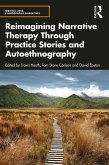Handbook of Ethnography in Healthcare Research (eBook, ePUB)
Redaktion: Hackett, Paul; Hayre, Christopher


Alle Infos zum eBook verschenken

Handbook of Ethnography in Healthcare Research (eBook, ePUB)
Redaktion: Hackett, Paul; Hayre, Christopher
- Format: ePub
- Merkliste
- Auf die Merkliste
- Bewerten Bewerten
- Teilen
- Produkt teilen
- Produkterinnerung
- Produkterinnerung

Hier können Sie sich einloggen

Bitte loggen Sie sich zunächst in Ihr Kundenkonto ein oder registrieren Sie sich bei bücher.de, um das eBook-Abo tolino select nutzen zu können.
This handbook provides an up-to-date reference point for ethnography in healthcare research. Taking a multi-disciplinary approach, the chapters offer a holistic view of ethnography within medical contexts.
This edited volume is organized around major methodological themes, such as ethics, interviews, narrative analysis and mixed methods. Through the use of case studies, it illustrates how methodological considerations for ethnographic healthcare research are distinct from those in other fields. It has detailed content on the methodological facets of undertaking ethnography for prospective…mehr
- Geräte: eReader
- mit Kopierschutz
- eBook Hilfe
![Handbook of Ethnography in Healthcare Research (eBook, PDF) Handbook of Ethnography in Healthcare Research (eBook, PDF)]() Handbook of Ethnography in Healthcare Research (eBook, PDF)61,95 €
Handbook of Ethnography in Healthcare Research (eBook, PDF)61,95 €![Phenomenology as Qualitative Research (eBook, ePUB) Phenomenology as Qualitative Research (eBook, ePUB)]() John PaleyPhenomenology as Qualitative Research (eBook, ePUB)48,95 €
John PaleyPhenomenology as Qualitative Research (eBook, ePUB)48,95 €![Health Psychology (eBook, ePUB) Health Psychology (eBook, ePUB)]() Deborah Fish RaginHealth Psychology (eBook, ePUB)48,95 €
Deborah Fish RaginHealth Psychology (eBook, ePUB)48,95 €![Reimagining Narrative Therapy Through Practice Stories and Autoethnography (eBook, ePUB) Reimagining Narrative Therapy Through Practice Stories and Autoethnography (eBook, ePUB)]() Reimagining Narrative Therapy Through Practice Stories and Autoethnography (eBook, ePUB)45,95 €
Reimagining Narrative Therapy Through Practice Stories and Autoethnography (eBook, ePUB)45,95 €![Mothering Babies in Domestic Violence (eBook, ePUB) Mothering Babies in Domestic Violence (eBook, ePUB)]() Fiona BuchananMothering Babies in Domestic Violence (eBook, ePUB)37,95 €
Fiona BuchananMothering Babies in Domestic Violence (eBook, ePUB)37,95 €![Translational Health Informatics (eBook, ePUB) Translational Health Informatics (eBook, ePUB)]() Translational Health Informatics (eBook, ePUB)51,95 €
Translational Health Informatics (eBook, ePUB)51,95 €![Pragmatic Healthcare Ethnography (eBook, ePUB) Pragmatic Healthcare Ethnography (eBook, ePUB)]() Alison B. HamiltonPragmatic Healthcare Ethnography (eBook, ePUB)35,95 €
Alison B. HamiltonPragmatic Healthcare Ethnography (eBook, ePUB)35,95 €-
-
-
This edited volume is organized around major methodological themes, such as ethics, interviews, narrative analysis and mixed methods. Through the use of case studies, it illustrates how methodological considerations for ethnographic healthcare research are distinct from those in other fields. It has detailed content on the methodological facets of undertaking ethnography for prospective researchers to help them to conduct research in both an ethical and safe manner. It also highlights important issues such as the role of the researcher as the key research instrument, exploring how one's social behaviours enable the researcher to 'get closer' to his/her participants and thus uncover original phenomena. Furthermore, it invites critical discussion of applied methodological strategies within the global academic community by pushing forward the use of ethnography to enhance the body of knowledge in the field.
The book offers an original guide for advanced students, prospective ethnographers, and healthcare professionals aiming to utilize this methodological approach.
Dieser Download kann aus rechtlichen Gründen nur mit Rechnungsadresse in A, B, BG, CY, CZ, D, DK, EW, E, FIN, F, GR, HR, H, IRL, I, LT, L, LR, M, NL, PL, P, R, S, SLO, SK ausgeliefert werden.
- Produktdetails
- Verlag: Taylor & Francis eBooks
- Seitenzahl: 556
- Erscheinungstermin: 2. Dezember 2020
- Englisch
- ISBN-13: 9781000263985
- Artikelnr.: 60626884
- Verlag: Taylor & Francis eBooks
- Seitenzahl: 556
- Erscheinungstermin: 2. Dezember 2020
- Englisch
- ISBN-13: 9781000263985
- Artikelnr.: 60626884
- Herstellerkennzeichnung Die Herstellerinformationen sind derzeit nicht verfügbar.
Acknowledgements
Foreword (Shane Blackman)
Section 1: Introduction
1. Introducing Ethnography and its Rationale for Healthcare Practitioner
Use (Christopher M. Hayre and Paul M. W. Hackett)
Section 2: Ethical Considerations
2. Ethical Considerations in Ethnography (Jessica Schwarzenbach and Paul M.
W. Hackett)
3. Ethics of Online Research with Human Participants (Jeff Gavin and Karen
Rodham)
4. Cultural Variation in Informed Consent for Clinical Research
Participation (David Resnik and Julia Hecking)
5. Encountering Hostility in Ethnographic Research (Christopher M. Hayre
and Paul M. W. Hackett)
Section 3: Design and planning
6. The door-to-door ethnographer: Recruiting patients and health care
providers for ethnographic research (Melinda Rea Holloway and Steve
Hagelman)
7. Ethnographic research design (Ruth Mongomery-Andersen and Michelle
Doucette Issaluk)
8. The declarative mapping sentence as a framework for conducting
ethnographic health research (Paul M. W. Hackett)
Section 4: Interviewing in ethnographic research
9. Getting deep in the pain: Understanding people through ethnographic
research (Antonella Fabri)
10. An Ethnography of a Play Environment (Hira Hasan)
11. To be on a diet: Ethnography of weight loss between beauty, food and
violence (Martina Grimaldi)
12. The Clinician-Patient Interaction - Crossing the chasm of expectations
(Gillie Gabay)
13. Constructing Ethnographic Data In Medical Education (Jonathan Tummons)
Section 5: Visual/Sensory Ethnography
14. Visual Ethnography in Health and Healthcare: Concepts, Steps and Good
Practice (Laura Lorenz and Bettina Kolb)
Section 6: Auto/ethnography
15. Institution(alization), bureaucracy and wellbeing? An organizational
ethnography of perinatal care within the National Health Service (Tom Vine)
16. Critical Auto/ethnography and Mental Health Research (Stacy
Holman-Jones and Anne Harris)
Section 7: Observational methods in ethnographic research
17. Ethnographers in scrubs: Ethnographic observation within healthcare (
Melinda Rea Holloway and Steve Hagelman)
18. Ethnographic investigations of a diagnostic imaging department (Ruth
Strudwick)
19. The ALIVE! Project: Understanding the intersection Between Faith and
Soul Food Using Ethnographic Methods (Deidre Guthrie)
Section 8: Note taking and writing up
20. Field Notes in Ethnographic Research (Ruth Strudwick)
21. Writing and Representation (Michael Klingenberg)
Section 9: Journals and diaries
22. From Happy Meals to Real Play (Nick Agafonoff)
23. Ethnographic diaries and journals: principles, practices and dilemmas (
Graham Hall)
Section 10: Narrative Analysis
24. Narrative ethnography: How to study stories in the context of their
telling (Ditte Andersen)
25. In the Quest of Resilience in Elder Patients (Gillie Gabay)
26. An the Anthropologist Made the 'Emotional Note' (Haris Agic)
Section 11: Projective Techniques
27. Projective techniques in health research (Taylor Malone and Paul M. W.
Hackett)
28. Being Creative Using Projective Techniques (Paul M. W. Hackett)
Section 12: Focus Groups
29. Using Focus Groups in Healthcare Research (Alicia Carlson and Paul
Hackett)
30. Focus Group Research in Healthcare (Immy Holloway)
Section 13: Multiple Methods
31. Becoming a physician of the people in a rural mountain community in
Mexico (Deidre Guthrie)
32. Breaking Down Silos: The Value of Interdisciplinary production of
knowledge for (health) innovation (Tamira Snell)
Section 14: Analysing data
33. Analyzing the data: Conditions-, meanings-, and reasoning analysis (
Tine Agaard)
34. Computer-Assisted Qualitative Data Analysis Software (CAQDAS) and
Ethnographic Health Research (Áine Humble)
35. Ethnographic and Qualitative Data Analysis (Immy Holloway)
36. Ethnographic Creative Non-Fiction: The Creation and Evolution of Lily's
Lymphedema (Elise Radina)
Section 15: Novel Approaches
37. Mapping Network Disturbances: Case Studies that demonstrate the use of
an ethnographic approach to health and well-being research (Maria Louise
Bønnelykke)
38. Why happiness studies ought to include qualitative research components
(Cathrine Jansson-Boyd and Anke Plagnol )
39. A Whole-School Approach to Health and Wellbeing: A Case Study of a
Primary School (Jonathan Glazzard)
Section 16: Conclusion
40. Conclusions and the future of ethnography in health related research:
challenges and innovations (Paul M. W. Hackett and Christopher M. Hayre)
41. Coronavirus and COVID-19: Qualitative Healthcare Research During and
After the Pandemic (Paul M. W. Hackett and Christopher M. Hayre)
42. Black Lives Matter: Birdwatching in Central Park and the Murder of
George Floyd (Paul M.W. Hackett and Jessica Schwarzenbach)
Acknowledgements
Foreword (Shane Blackman)
Section 1: Introduction
1. Introducing Ethnography and its Rationale for Healthcare Practitioner
Use (Christopher M. Hayre and Paul M. W. Hackett)
Section 2: Ethical Considerations
2. Ethical Considerations in Ethnography (Jessica Schwarzenbach and Paul M.
W. Hackett)
3. Ethics of Online Research with Human Participants (Jeff Gavin and Karen
Rodham)
4. Cultural Variation in Informed Consent for Clinical Research
Participation (David Resnik and Julia Hecking)
5. Encountering Hostility in Ethnographic Research (Christopher M. Hayre
and Paul M. W. Hackett)
Section 3: Design and planning
6. The door-to-door ethnographer: Recruiting patients and health care
providers for ethnographic research (Melinda Rea Holloway and Steve
Hagelman)
7. Ethnographic research design (Ruth Mongomery-Andersen and Michelle
Doucette Issaluk)
8. The declarative mapping sentence as a framework for conducting
ethnographic health research (Paul M. W. Hackett)
Section 4: Interviewing in ethnographic research
9. Getting deep in the pain: Understanding people through ethnographic
research (Antonella Fabri)
10. An Ethnography of a Play Environment (Hira Hasan)
11. To be on a diet: Ethnography of weight loss between beauty, food and
violence (Martina Grimaldi)
12. The Clinician-Patient Interaction - Crossing the chasm of expectations
(Gillie Gabay)
13. Constructing Ethnographic Data In Medical Education (Jonathan Tummons)
Section 5: Visual/Sensory Ethnography
14. Visual Ethnography in Health and Healthcare: Concepts, Steps and Good
Practice (Laura Lorenz and Bettina Kolb)
Section 6: Auto/ethnography
15. Institution(alization), bureaucracy and wellbeing? An organizational
ethnography of perinatal care within the National Health Service (Tom Vine)
16. Critical Auto/ethnography and Mental Health Research (Stacy
Holman-Jones and Anne Harris)
Section 7: Observational methods in ethnographic research
17. Ethnographers in scrubs: Ethnographic observation within healthcare (
Melinda Rea Holloway and Steve Hagelman)
18. Ethnographic investigations of a diagnostic imaging department (Ruth
Strudwick)
19. The ALIVE! Project: Understanding the intersection Between Faith and
Soul Food Using Ethnographic Methods (Deidre Guthrie)
Section 8: Note taking and writing up
20. Field Notes in Ethnographic Research (Ruth Strudwick)
21. Writing and Representation (Michael Klingenberg)
Section 9: Journals and diaries
22. From Happy Meals to Real Play (Nick Agafonoff)
23. Ethnographic diaries and journals: principles, practices and dilemmas (
Graham Hall)
Section 10: Narrative Analysis
24. Narrative ethnography: How to study stories in the context of their
telling (Ditte Andersen)
25. In the Quest of Resilience in Elder Patients (Gillie Gabay)
26. An the Anthropologist Made the 'Emotional Note' (Haris Agic)
Section 11: Projective Techniques
27. Projective techniques in health research (Taylor Malone and Paul M. W.
Hackett)
28. Being Creative Using Projective Techniques (Paul M. W. Hackett)
Section 12: Focus Groups
29. Using Focus Groups in Healthcare Research (Alicia Carlson and Paul
Hackett)
30. Focus Group Research in Healthcare (Immy Holloway)
Section 13: Multiple Methods
31. Becoming a physician of the people in a rural mountain community in
Mexico (Deidre Guthrie)
32. Breaking Down Silos: The Value of Interdisciplinary production of
knowledge for (health) innovation (Tamira Snell)
Section 14: Analysing data
33. Analyzing the data: Conditions-, meanings-, and reasoning analysis (
Tine Agaard)
34. Computer-Assisted Qualitative Data Analysis Software (CAQDAS) and
Ethnographic Health Research (Áine Humble)
35. Ethnographic and Qualitative Data Analysis (Immy Holloway)
36. Ethnographic Creative Non-Fiction: The Creation and Evolution of Lily's
Lymphedema (Elise Radina)
Section 15: Novel Approaches
37. Mapping Network Disturbances: Case Studies that demonstrate the use of
an ethnographic approach to health and well-being research (Maria Louise
Bønnelykke)
38. Why happiness studies ought to include qualitative research components
(Cathrine Jansson-Boyd and Anke Plagnol )
39. A Whole-School Approach to Health and Wellbeing: A Case Study of a
Primary School (Jonathan Glazzard)
Section 16: Conclusion
40. Conclusions and the future of ethnography in health related research:
challenges and innovations (Paul M. W. Hackett and Christopher M. Hayre)
41. Coronavirus and COVID-19: Qualitative Healthcare Research During and
After the Pandemic (Paul M. W. Hackett and Christopher M. Hayre)
42. Black Lives Matter: Birdwatching in Central Park and the Murder of
George Floyd (Paul M.W. Hackett and Jessica Schwarzenbach)







